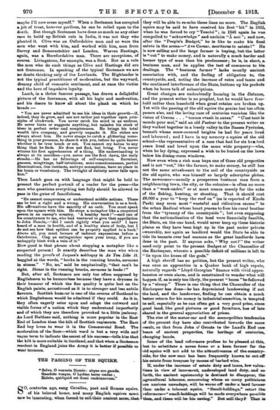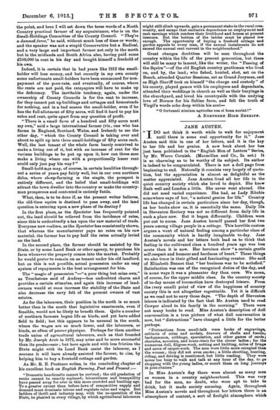THE PASSING OF THE SQUIRE.
"Salve, 0 vennsta Sirmio: atque ero gande.
Gaudete vosque, 0 Lydiae !acne undae ; Bidet% quidquid et domi cachinnorum."
S0, centuries ago, sang Catullue, poet and Roman squire. of his beloved home, and many English squires retest uow be lamenting, when forced. to sell their ancient acres, that
they will be able to re-echo these lines no more. The English squire may be said to have received his first "hit" in 1832, when he was forced to cry " Touche "; in 1848 again he was compelled to "acknowledge" and exclaim "X moi and now, after the "People's Budget," he is like to make his final salute in the arena—" Ave Caesar, rnoriturus te saluto!" He is now selling and the large farmer is buying, but the latter is "out" to make money, and is naturally a much harder and keener type of man than his predecessor; he is, in short, a. business man, and he applies the test of commerce to his dealings. The "business farmer" lacks usually ancient association with, and the feeling of obligation to, the countryside, and, noting the increase of rates and taxes and the continued interference of the State, buttons up his pockets when he hears talk of subscriptions.
Great changes are undoubtedly looming in the distance, and the present writer is no prophet, but he would have free- hold rather than leasehold when great estates are broken up. Yet with the passing of the old squire the genius loci too often passes also, and the loving care of centuries vanishes like the vision of Creusa . . . " tenues evasit in auras." " C'est tout le monde pour tnoi," said an old Pasteur to the present writer as they walked together in a lonely valley in the Basses Pyrenees, beneath whose snow-covered heights he had for years lived and laboured ; and I have in my memory a squire of the old school—the representative of a race that had for six bun ired years lived and loved upon the same wide property—who, when he lay dying, expressed a wish to be buried on the lawn below his dining-room windows.
Now even when a rich man buys one of these old properties and is not "out," like the farmer, to make money, he still has not the same attachment to the soil of the countryside as the old squire, who was himself so largely adscriptus glebae. The newcomer—usually a prosperous business man from a. neighbouring town, the city, or the colonies—is often no more than a "week-ender," or at most comes merely for the sake of the fishing, hunting, or shooting. That it should cost £6,000 a year to "keep the roof on" (as is reported of Knole Park) may seem most "wasteful and ridiculous excess" to the urban Radical whose heart yearns to free his rural brother from the "tyranny of the countryside "; but even supposing that the nationalisation of the land were financially feasible, the State, on the one hand, would never keep up these historic places as they have been kept up in the past under private ownership, nor again as landlord would the State be able to tide its tenants over bad seasons as the great landlords have done in the past. If anyone asks, "Why not?" the writer need only point to the present Budget of the Chancellor of the Exchequer, wherein a possible deficit of millions is left to "lie upon the knees of the gods."
A high sheriff has no politics, but the present writer, who was once an apprentice in a Quaker bank of high repute, naturally regards " Lloyd-Georgian " finance with vivid appre- hension or even alarm, and is constrained to wonder what will happen if, as is only too likely, the present "boom "be followed by a "slump." There is one thing that the Chancellor of the Exchequer has done—he has depreciated landowning if not the land, and the landowner, finding he can obtain a much better return for his money in industrial securities, is tempted to sell, especially as he can often get a very good price, since good land, like good pictures or good furniture, has of late shared in the general appreciation of prices.
The rise of the motor-ear and the cosmopolitan tendencies of the present day have also contributed towards the same result, so that from John o' Groats to the Land's End one hears of ancient properties, the heritage of centuries, changing hands.
Some of the land reformers profess to be pleased at this, hat to substitute a novas homo or a keen farmer for the old squire will not add to the attractiveness of the country- side, for the new man has been frequently known to cut off his estate from trespass by means of barbed wire.
If, under the increase of estate duty and taxes, low valua- tions in view of increment, undeveloped land duty, and so forth, the ancient squirearchy is destined to disappear, the agricultural labourer, concerning whom so many politicians are anxious nowadays, will. be worse off under a hard farmer than under a tolerant squire. "Small-holdings." retort the reformers—" small-holdings will be made everywhere possible then, and these will be his saving." But will they ? That is the point, and here I will set down the terse words of a. North Country practical farmer of my acquaintance, who is on the
Small-Holdings Committee of the County Council. "They're a damned farce," he said, without much loss of time or words;
and the speaker was not a stupid Conservative but a Radical, and a very large and important farmer not only in the north but in the midlands and South Africa also, having paid some £100,000 in rent in his day and bought himself a freehold of his own.
Indeed, it is certain that in bad years like 1912 the small- holder will lose money, and but recently in my own county some unfortunate small-holders have been summoned for non- payment of the poor-rate, and eventually, of course, where the rents are not paid, the ratepayers will have to make up the deficiency. The inevitable tendency, again, under the ownership of County Councils is for the rent to increase, for they cannot put up buildings and cottages and homesteads for nothing, and in a bad season the small-holder, even if he has the full allotment of fifty acres, will find it hard to pay his rates and rent, quite apart from any question of profit.
"There is a small farm of a hundred and fifty acres next my own," said a large international farmer (viz., one who has farms in England. Scotland, Wales. and Ireland) to me the other day, " which the County Council is taking over and about to split up into three small-holdings of fifty acres each. Well, the last tenant of the whole farm barely contrived to make a living out of it, but with an increase of rent for the various buildings to be put up upon it, how can three men make a living where one with a proportionally lesser rent could only just pay his way ?"
Small-holdings may, of course, in certain localities through- out a series of years pay fairly well, but in our own northern dales, where sheep-farming is the staple, the prospect is entirely different, and the belief that small-holdings will attract the town dweller into the country or make the country- man prosperous and contented is entirely futile.
What, then, is to be done if, as the present writer believes, the old-time squire is destined to pass away, and the land question is entering upon a new phase of its destiny ?
In the first place, as the Spectator has frequently pointed out, the land should be relieved from the incidence of rates, since this is undoubtedly a tax upon the raw material of trade. Everyone now realizes, as the Spectator has consistently shown, that whereas the manufacturer pays no rates on his raw material, the farmer has to pay half the rates actually levied on the land.
In the second place, the farmer should be assisted by the State, or by some Land Bank or other agency, to purchase his farm whenever the property comes into the market. Probably he would preter to remain on as tenant under his old landlord, but as this is not possible, actual possession under an easy system of repayments is the best arrangement for him.
The "magic of possession "—"a poor thing but mine own," as Touchstone said of Audrey—has undoubted charm and provides a certain stimulus, and again this increase of land- owners would at once increase the stability of the State and also decrease the envy felt of the present owners of vast estates.
As for the labourers, their position in the north is so much better than in the south that legislative enactments, even if feasible, would not be likely to benefit them. Quite a number of northern farmers began life as hinds, and yet have added field to field; but this appears to be unusual in the south, where the wages are so much lower, and the labourers, or hinds, so often of poorer physique. Perhaps for them another trade union of agricultural labourers, such as that founded by Mr. Joseph Arch in 1872, may arise and be more successful than its predecessor ; but here again and with less friction the State might with its Land Bank assist the labourer, as I assume it will have already assisted the farmer, to rise, by helping him to buy a freehold cottage and garden..
As Mr. R. E. Prothero writes, in the concluding chapter of his excellent book on English Farming, Past and Present :—
" Domestic handicrafts cannot be revived ; the old gradation of ranks cannot be exactly replaced; leisureliness and tranquillity have passed away for ever in this more crowded and bustling age. To a greater extent than before laws of competitive supply and demand must dominate labour and regulate rates and wages. But ladders of thrift and industry may, with the co-operation of the State, be planted in every village, by which agricultural labourers might still climb upwards, gain a permanent stake in the rural com- munity, and escape that exclusive dependence on employment and cash earnings which renders their livelihood and homes at present insecure. But the bottom of the ladder must be placed low enough. The opportunity of buying a freehold cottage and garden appeals to every man, if the annual instalments do not exceed the annual rent current in the neighbourhood."
Great changes doubtless will be seen throughout the country within the life of the present generation, but there will still be many to lament, like the writer, the "Passing of the Squire "—of the old English country gentleman who lived on, and by, the land ; who fished, bunted, shot, sat on the Bench, attended Quarter Sessions, sat as Grand Juryman, and as High Sheriff took on himself "the charge and custody" of his county, played games with his employees and dependants, attended their weddings in church as well as their buryings in the churchyard, and loved his countryside with the undying love of Horace for his Sabine farm, and felt the truth of Virgil's words echo deep within his soul—
"0 fortunati nimium agricolae sus si bona norint
A NORTHERN HIGH SHERIFF.



































































 Previous page
Previous page